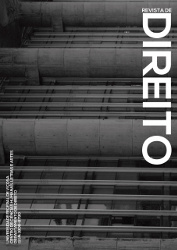Social entitlements and economic policy in Brazil (2015-16)
between the ballots and capital flight
DOI:
https://doi.org/10.32361/2022140113193Keywords:
Social entitlements, Capital flight, economic austerityAbstract
Since 2015, economic policy in Brazil has given priority to austerity measures geared at securing the confidence of market agents. The shift happened after an election outcome manifested the wish for continuity of redistributive policies, which correspond to social entitlements. The contractionary project was intensified in 2016, especially after the removal of the elected government from office, deepening the divide with the electoral results. Drawing from elements regarding law, economics and international relations, the present essay seeks to approach the tension rising between the ballots and expectations of financial investors in the definition of economic policy, relevant to legal institutions.
Downloads
References
BHAGWATI, Jagdish. In defense of globalization. New York: Oxford University Press, 2004.
BLYTH, Mark. The transformation of the Swedish model: economic ideas, distributional conflict, and institutional change. World Politics, v. 54, n. 1, 2001, p. 1-26.
BRESSER-PEREIRA, Luiz Carlos. A crise financeira global e depois: um novo capitalismo? Novos Estudos (CEBRAP), n. 86, 2010, p. 51-72.
CASTRO, Marcus Faro de. Análise Jurídica da Política Econômica. Revista da Procuradoria-Geral do Banco Central, v. 3, 2009, p. 17-71.
CASTRO, Marcus Faro de. Economic development and the legal foundations of regulation in Brazil. De Gruyter – Law and Development Review, v. 6, n. 1, 2013, p. 61-115.
CASTRO, Marcus Faro de. Formas jurídicas e mudança social: interações entre o direito, a filosofia, a política e a economia. São Paulo: Saraiva, 2012.
CASTRO, Marcus Faro de. Instituições econômicas: evolução de seus elementos constitucionais na sociedade de mercado. Revista de Direito Empresarial. Curitiba, n. 6, jul./dez. 2006, p. 41-62.
CHANG, Ha-Joon; GRABEL, Illene. Reclaiming development: an alternative economic policy manual. London: Zed Books, 2004.
COASE, Ronald H. The nature of the firm. Economica, New Series, v. 4, n. 16, 1937, p. 386-405.
DAVIDSON, Paul. Post keynesian economics: solving the crisis in economic theory. In: BELL, Daniel; KRISTOL; Irving (eds). The crisis in economic theory. New York: Basic Books, 1981, p. 151-173.
DRUMMOND, Carlos. A punhalada fiscal de Levy e Dilma: medidas do governo atingem os trabalhadores mais vulneráveis. Carta Capital. 2015. Disponível em: http://www.cartacapital.com.br/revista/833/punhalada-fiscal-5133.html. Acesso em: 12 dez. 2016.
EICHENGREEN, Barry. Globalizing capital: a history of the international monetary system. 2. ed. Princeton: Princeton University Press, 2008.
FIANI, Ronaldo. Cooperação e conflito: instituições e desenvolvimento econômico. Rio de Janeiro: Elsevier, 2011.
GALBRAITH, John Kenneth. Moeda: de onde veio, para onde foi. 2. ed. São Paulo: Pioneira, 1997.
GALBRAITH, John Kenneth. O pensamento econômico em perspectiva: uma história crítica. São Paulo: Pioneira, 1989.
GUTTMANN, Robert. Uma introdução ao capitalismo dirigido pelas finanças. Novos Estudos (CEBRAP), n. 82, 2008, p. 11-33.
HALL, Peter A. The movement from keynesianism to monetarism: institutional analysis and British economic policy in the 1970s. In: STEINMO, Sven; THELEN, Kathleen; LONGSTRETH, Frank (eds.). Structuring politics: historical institutionalism in comparative analysis. Cambridge: Cambridge University Press, 1992. p. 90-113.
HELLEINER, Eric. States and the reemergence of global finance: from Bretton Woods to the 1990s. Ithaca: Cornell University Press, 1994.
KEYNES, John Maynard. A teoria geral do emprego, do juro e da moeda. São Paulo: Nova Cultural, 1996 [1936].
KRUGMAN, Paul. The return of depression economics and the crisis of 2008. New York: W.W. Norton & Company, 2009.
LA PORTA, Rafael; LOPEZ-DE-SILANEZ, Florencio; SHLEIFER, Andrei; VISHNY, Robert W. Law and finance. The Journal of Political Economy, v. 106, n. 6, 1998, p. 1113-1155.
MARTÍNEZ, Juan; SANTISO, Javier. Financial markets and politics: the confidence game in Latin American emerging economies. International Political Science Review, 2003, v. 24, n. 3, p. 363-395.
MERCURO, Nicholas; MEDEMA, Steven G. Chicago Law and Economics. In: MERCURO, Nicholas; MEDEMA, Steven G. Economics and the law: from Posner to post-modernism and beyond. 2. ed. Princeton: Princeton University Press, 2006, p. 94-155.
NORTH, Douglass C. Institutions, Institutional Change and Economic Performance. Cambridge: Cambridge University Press, 1991.
PECK, Jamie; THEODORE; Nik; BRENNER, Neil. Mal-estar no pós-neoliberalismo. Novos Estudos (CEBRAP), n. 92, 2012, p. 59-78.
PIKETTY, Thomas. Introduction. In: PIKETTY, Thomas. Capital in the twenty-first century. Cambridge: Harvard University Press, 2014, p. 1-35.
PLEHWE, Dieter. Introduction. In: MIROWSKI, Philip; PLEHWE, Dieter (eds.). The road from Mont Pèlerin: the making of the neoliberal thought collective. Cambridge: Harvard University Press, 2009, p. 1-44.
POLANYI, Karl. The great transformation: the political and economic origins of our time. Boston: Beacon Press, 2001 [1944].
RODRIK, Dani. One economics, many recipes: globalization, institutions and economic growth. Princeton: Princeton University Press, 2007.
RUGGIE, John Gerard. International regimes, transactions, and change: embedded liberalism in the postwar economic order. International Organization, v. 36, n. 2, 1982, p. 379-415.
SALAMA, Bruno. O que é pesquisa em direito e economia? Cadernos de Direito GV, v. 5, n. 2, mar. 2008, p. 5-58.
SATO, Eiiti. Economia e política das relações internacionais. Belo Horizonte: Fino Traço, 2012.
TELES, Stephen M. The rise of the conservative legal movement: the battle for control of the law. Princeton: Princeton University Press, 2008.
TURNER, Rachel S. Neo-liberal ideology: history, concepts and policies. Edinburgh: Edinburgh University Press, 2008.
WOLF, Martin. From imbalances to the subprime crisis. In: WOLF, Martin. Fixing global finance. 2. ed. Baltimore: Johns Hopkins University Press, 2010, p. 193-214.
Downloads
Published
How to Cite
Issue
Section
License
Copyright (c) 2022 Journal of Law

This work is licensed under a Creative Commons Attribution-NonCommercial 4.0 International License.
The published work is the entirely the responsibility of the authors, and Revista de Direito is only responsible for its evaluation, as a medium for scientific publication.
After publication, the authors cede the copyright, which becomes the property of Revista de Direito.
Revista de Direito is not responsible for any violations of Law No. 9,610/1998, the Brazilian Copyright Law.
In the identification of plagiarism and self-plagiarism, the manuscript will be rejected.















